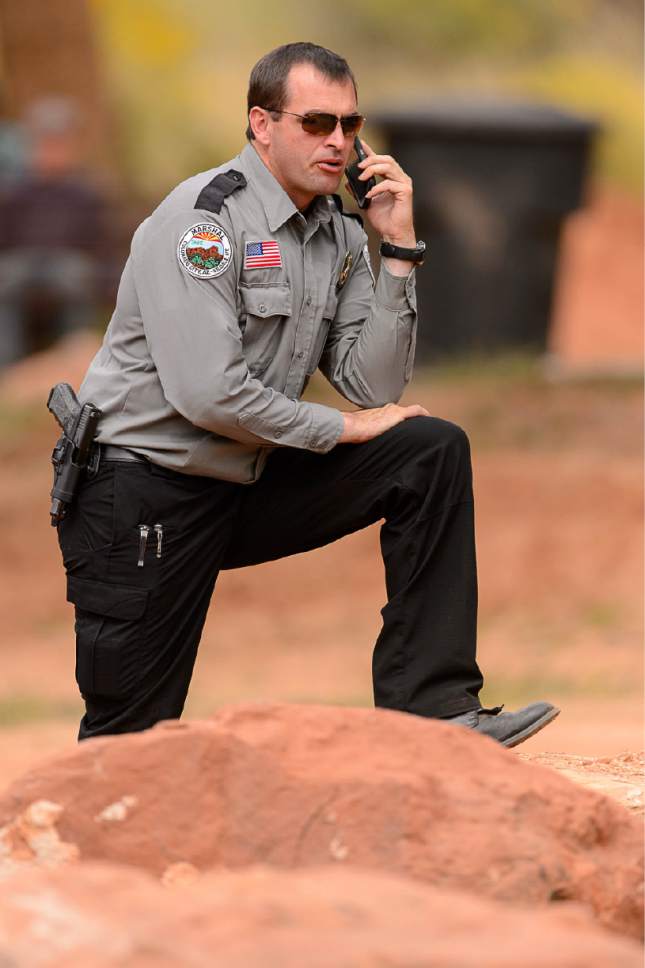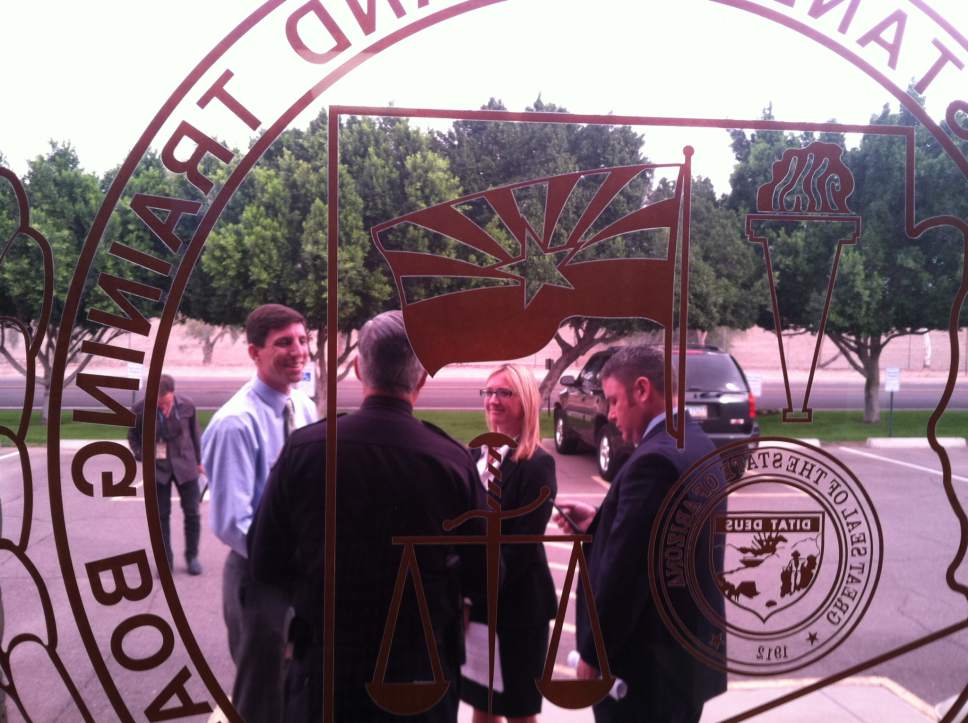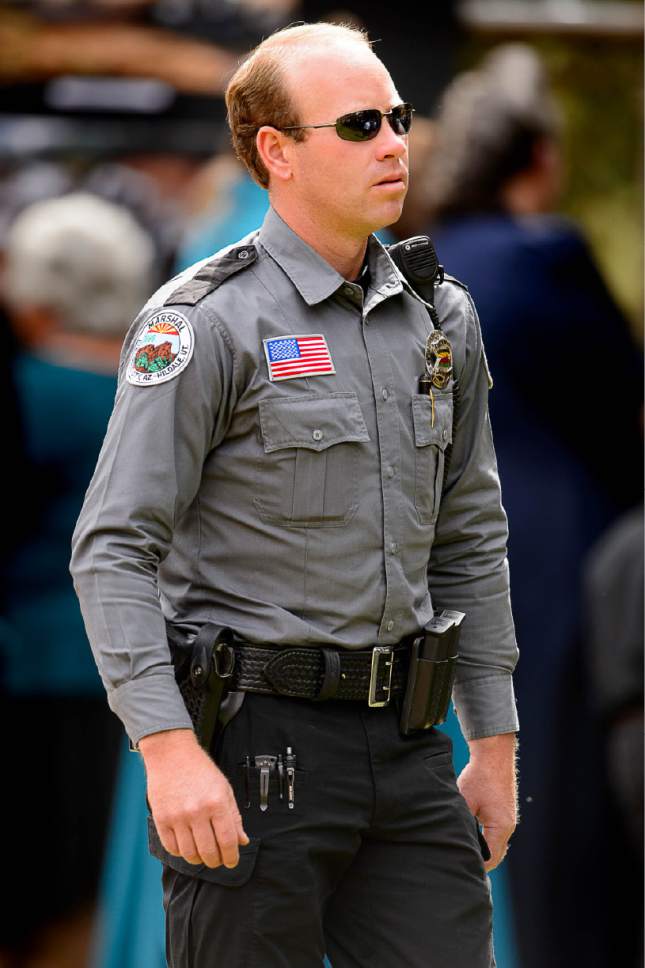This is an archived article that was published on sltrib.com in 2016, and information in the article may be outdated. It is provided only for personal research purposes and may not be reprinted.
After four years, Utah's investigations into four police officers in a polygamous community each ended with a single sentence.
"POST investigation determined there was insufficient evidence at this time to prove Darger violated 76-8-201, Official Misconduct, 76-6-206 Criminal Trespassing, or 76-5-304 Unlawful Detention (False Arrest)," reads the conclusion in the case of one officer, written in July of this year in the language used at the Utah Peace Officer Standards and Training (POST) Council, which regulates police in the state.
"Darger" is Jerry Darger, chief marshal of Hildale, Utah, and Colorado City, Ariz., collectively known as Short Creek, which is the home of the Fundamentalist Church of Jesus Christ of Latter-Day Saints. Similar sentences were written to close investigations for three other Short Creek marshals. The numbers in the sentence reference sections of Utah code that the marshals were suspected of violating.
Put another way, the marshals were suspected of being biased in favor of FLDS members.
In the four years Utah authorities spent investigating, two federal civil juries found the marshals violated the civil rights of nonmembers. The marshals are certified as law enforcement in Utah and Arizona, and, in late 2015, the Arizona Peace Officer Standards and Training Board — the counterpart to Utah's police regulators — started its own investigation of the marshals.
Last month, that body voted to begin revoking the police powers of six marshals in Hildale and Colorado City. Those marshals remain on the job while they appeal.
While the law in Utah is different than in Arizona, the contrasts have left some Short Creek residents frustrated with the Beehive State and reinforced for them an old refrain that Utah is unwilling to pursue its outlaw polygamists.
"It just blew my socks off," Isaac Wyler said of learning the Utah POST investigation had stopped. "I just really didn't believe it."
Wyler, a former FLDS follower who lives in Colorado City, has been complaining about the marshals for a long time. He testified in two federal civil rights trials that involved the marshals and the municipal governments. A family won a verdict in 2014, and earlier this year the U.S. Department of Justice secured a verdict as well.
Through the years, Wyler has reported dozens of cases of vandalism and theft to the Short Creek marshals, but has rarely seen them investigate. Instead, the marshals once cited him for having an animal at large. His horse escaped after someone cut his fence.
Wyler spoke to investigators from Utah POST, too, and insists they were well aware the marshals were biased.
"That's why they kept the investigation going for four years," Wyler said.
Utah law allows POST to suspend or revoke the police powers of officers for a few specific offenses, including criminal conduct, sex on duty, and drug and alcohol problems. Records Utah POST provided to The Salt Lake Tribune show the agency began an investigation of four of the marshals March 8, 2012.
The agency received complaints that the four marshals, Darger, Samuel Johnson, Hyrum Roundy and Curtis L. Cooke, were giving "preferential treatment" and "allegedly conducted investigations enforced the law and made arrests in a biased manner based on religious affiliation," the documents say. These papers also noted the four were FLDS members.
Kelly Sparks, deputy director of Utah POST, said last week that investigators interviewed many witnesses. The agency needs to find "clear and convincing evidence" of criminal conduct, he said.
While juries may have found civil rights violations, Sparks explained, Utah POST couldn't find enough evidence that any marshal committed a crime.
"We wanted to make sure we did a thorough job," Sparks said, "and at some point we came to the conclusion that we didn't have the evidence that we needed to proceed with some kind of action."
One issue Sparks said Utah POST investigated was whether the Short Creek marshals looked up license plates and other personal information in police databases so that information could be shared with FLDS leaders or the church's security force. Other Utah police officers have been disciplined for misusing such databases by, for example, looking up information about their ex-wives or girlfriends.
Sparks said investigators couldn't find enough evidence that a specific marshal misused the databases.
Arizona has more latitude to pursue police. The police board there can take action against "malfeasance, misfeasance or nonfeasance," according to its regulations.
Sparks said the Utah and Arizona investigators shared information with one another.
"I'm confident that we have the same information that was available to them," he said.
The Arizona regulators have accused Darger, Johnson, Roundy and deputy marshals Daniel R. Barlow, Jacob L. Barlow Jr. and Daniel N. Musser of a list of offenses that includes false arrests, not investigating certain crimes, not finishing reports and not sharing with investigators other family surnames they have used.
Curtis L. Cooke, who was investigated by both Utah and Arizona, resigned earlier this year. The marshal who replaced him is not under suspicion.
Attorneys for the marshals have criticized the Arizona case and said they plan to appeal.
Blake Hamilton, a Salt Lake City attorney who represents Hildale's municipal government, last month accused Arizona POST of pursuing "nickel and dime stuff," including some allegations that are a decade old. Jeff Matura, an attorney for Colorado City's municipal government, said it appeared Arizona was taking an alternative route to dissolving Short Creek's police force — something the federal judge who presided over this year's civil rights trial is considering doing anyway. The judge is expected to rule sometime after February.
Jeff Barlow, executive director of the United Effort Plan, a trust that owns much of the land and homes in Short Creek, said Utah has assisted in other ways in recent years, including helping negotiate settlements to lawsuits involving the trust and not interfering when the trust has sought to evict people who have not paid their occupancy fees.
"They're helping when it's appropriate," Barlow said, "and they're remaining not the sideline when it's appropriate."
Wyler said he is not angry at Utah POST investigators following the law, but he is perplexed at what people in Utah are supposed to do about policing they consider biased.
"I don't even know what you're supposed to show now," he said. "From what it was explained to me, it has to be an extremely egregious crime, and if it's not that, they're not going to do anything."
Sparks said people upset with the marshals should continue to share that information with Utah POST.
"If there are folks who are dissatisfied who have proof of actual wrongdoing," he said, "we would love for them to bring us that evidence."
If Arizona succeeds in revoking the police powers of the marshals, it wouldn't necessarily evoke the same action in Utah, Spark said. He said Utah POST would have to look at why, specifically, Arizona booted the marshals and whether it constituted clear and convincing evidence of a crime.
Twitter: @natecarlisle











